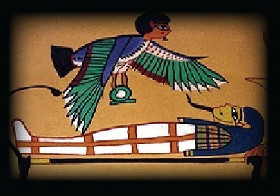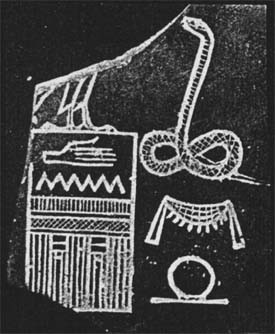Honestly what planet are these fruit cakes on attempting to administer semiconductor nanoparticles as vaccines? Get f real!
US LEGAL resident alien, WWG1WGA, Out of Darkness into Light. Tallyho!!
They believe they are the servants of the gods, that the natural order is for them to control us, physically, mentally, spiritually.
This is just the natural progression of that mentality.
I believe the descendants and followers of the priests Akhenaten excommunicated, will never have enough of revenge, ever... their hate is eternal.
A key in a tone? oh donot get me star te D!
😉
a mummifacation wearing a face mask?
US LEGAL resident alien, WWG1WGA, Out of Darkness into Light. Tallyho!!
Maybe so their Ka (spirit) knows they got the correct body...
😁👉🏻❤️
US LEGAL resident alien, WWG1WGA, Out of Darkness into Light. Tallyho!!
When I douse for water - I only feel the movement of the rods - not the force that is causing that movement...
Dowsing is a type of divination employed in attempts to locate ground water... also known as divining (especially in reference to interpretation of results)...
divination; plural noun: divinations
the practice of seeking knowledge of the future or the unknown by supernatural means.
"the Celtic art of divination"
fortune telling
divining
foretelling the future
forecasting the future
prophecy
prediction
soothsaying
augury
clairvoyance
second sight
magic
sorcery
witchcraft
spellworking
vaticination
sortilege
auspication
witchery
late Middle English: from Latin divinatio(n- ), from divinare ‘predict’ (see divine).
Divination (from Latin divinare, 'to foresee, to foretell, to predict, to prophesy', related to divinus, 'divine'), or "to be inspired by a god," is the attempt to gain insight into a question or situation by way of an occultic, standardized process or ritual.
adjective
adjective: divine; comparative adjective: diviner; superlative adjective: divinest
1.
of or like God or a god.
"heroes with divine powers"
godly
godlike
angelic
seraphic
saintly
beatific
spiritual
heavenly
celestial
devoted to God; sacred.
"divine liturgy"
religious
holy
sacred
sanctified
consecrated
blessed
devotional
devoted to God
dedicated to God
very pleasing; delightful.
"he had the most divine smile"
lovely
handsome
beautiful
good-looking
prepossessing
charming
delightful
appealing
engaging
winsome
ravishing
gorgeous
bewitching
beguiling
wonderful
glorious
marvellous
excellent
superlative
perfect
delicious
mouth-watering
delectable
bonny
heavenly
sublime
dreamy
sensational
knockout
stunning
super
great
tasty
fanciable
easy on the eye
a sight for sore eyes
as nice as pie
brilliant
brill
smashing
cute
beaut
beauteous
taking
comely
fair
sightly
divine; plural noun: divines; noun: Divine; noun: the Divine
1.
DATED
a cleric or theologian.
theologian
clergyman
member of the clergy
churchman
churchwoman
cleric
ecclesiastic
man of the cloth
man of God
holy man
holy woman
preacher
priest
kirkman
reverend
Holy Joe
sky pilot
josser
2.
providence or God.
late Middle English: via Old French from Latin divinus, from divus ‘godlike’ (related to deus ‘god’).
divine
/dɪˈvʌɪn/
verb: divine; 3rd person present: divines; past tense: divined; past participle: divined; gerund or present participle: divining
1.
discover (something) by guesswork or intuition.
guess
surmise
conjecture
suspect
suppose
assume
presume
deduce
infer
work out
theorize
hypothesize
discern
intuit
perceive
recognize
see
realize
appreciate
understand
grasp
apprehend
comprehend
figure
figure out
latch on to
cotton on to
catch on to
tumble to
get
get the picture
twig
suss
savvy
cognize
have supernatural or magical insight into (future events).
event; plural noun: events
a thing that happens or takes place, especially one of importance.
a single occurrence of a process, e.g. the ionization of one atom.
mid 16th century (originally in the sense ‘outcome, result’): from Latin eventus, from evenire ‘result, happen’, from e- (variant of ex- ) ‘out of’ + venire ‘come’.
occurrence
/əˈkʌr(ə)ns/
noun: occurrence; plural noun: occurrences
an incident or event.
event
incident
happening
phenomenon
affair
matter
experience
circumstance
development
contingency
eventuality
the fact or frequency of something happening.
the fact of something existing or being found in a place or under a particular set of conditions.
mid 16th century: probably from the plural of archaic occurrent, in the same sense, via French from Latin occurrent- ‘befalling’, from the verb occurrere (see occur).
From Middle English curraunt, borrowed from Old French curant (French courant), present participle of courre (“to run”), from Latin currere, present active infinitive of currō (“I run”) (present participle currens). Doublet of courant.
current (countable and uncountable, plural currents)
The generally unidirectional movement of a gas or fluid.
the part of a fluid that moves continuously in a certain direction, especially (oceanography) short for ocean current.
Synonyms: flow, stream
(electricity) the time rate of flow of electric charge.
Symbol: I (inclined upper case letter "I")
Units:
SI: ampere (A)
CGS: esu/second (esu/s)
Synonym: electric current
a tendency or a course of events
Synonyms: flow, stream, tendency
undercurrent (plural undercurrents)
A current of water which flows under the surface, and often in a different direction from surface currents.
(figuratively) A tendency of feeling or opinion that is concealed rather than exposed.
undercurrent (third-person singular simple present undercurrents, present participle undercurrenting, simple past and past participle undercurrented)
(transitive, also figuratively) To flow under some surface.
tense: surfaced; past participle: surfaced; gerund or present participle: surfacing
1.
rise or come up to the surface of the water or the ground.
"he surfaced from his dive"
come to the surface
come to the top
come up
rise
come to people's attention; become apparent.
emerge
arise
appear
come to light
come up
come into sight
come into view
come out
crop up
materialize
become visible
spring up
loom
of a person) appear after having been asleep.
get up
get out of bed
appear
rise
wake
awaken
early 17th century: from French(see sur-1, face), suggested by Latin superficies .
(intransitive) To rise to the surface.
(transitive) To bring to the surface.
(intransitive) To come out of hiding.
(intransitive) For information or facts to become known.
(transitive) To make information or facts known.
(intransitive) To work a mine near the surface.
(intransitive) To appear or be found.
From Middle English apperen, aperen, borrowed from Old French aparoir (French apparoir, apparaître), from Latin appāreō (“I appear”), from ad (“to”) + pāreō (“I come forth, I become visible”).
appear (third-person singular simple present appears, present participle appearing, simple past and past participle appeared)
(intransitive) To come or be in sight; to be in view; to become visible.
(intransitive) To come before the public.
A great writer appeared at that time
(intransitive) To stand in presence of some authority, tribunal, or superior person, to answer a charge, plead a cause, etc.; to present oneself as a party or advocate before a court, or as a person to be tried.



